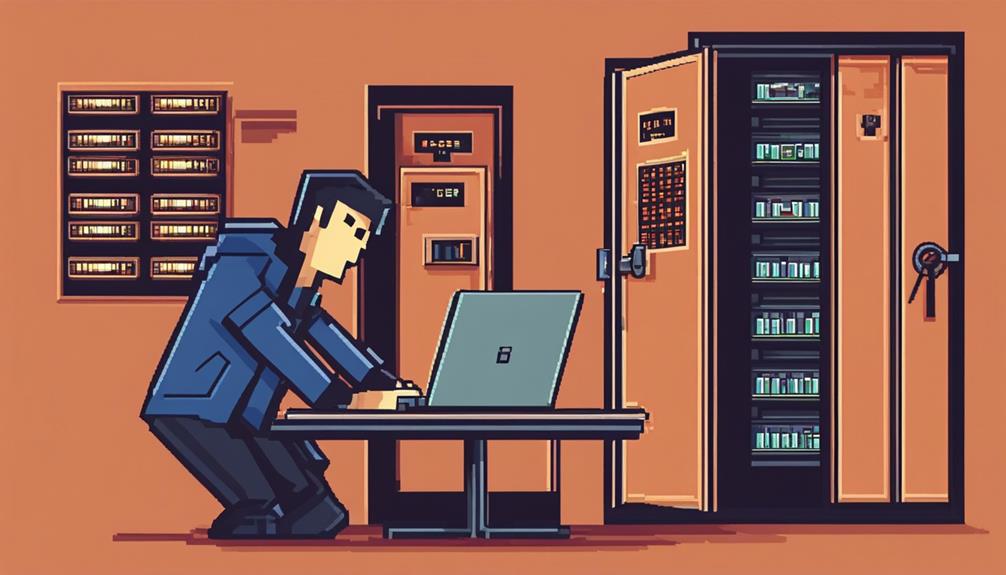Fixed deposits are generally safe but can be targeted by hackers. Banks like DBS, OCBC, and UOB offer security features like digiVault, Money Lock, and LockAway to protect funds. However, risks like phishing and weak passwords exist, requiring vigilance. Stay informed, use available protections, and monitor accounts regularly. Setting alerts and reporting suspicious activities promptly are essential. Leveraging digital locking mechanisms and activating emergency kill switches can help prevent unauthorized access. Ensuring the safety of fixed deposits involves utilizing all available security measures. Further details on safeguarding your funds are important for secure banking.
Key Takeaways
- Fixed deposits face hacking vulnerabilities despite security measures.
- Use digital locking features from banks like DBS, OCBC, and UOB.
- Stay vigilant against phishing scams and unauthorized access risks.
- Promptly report suspicious activity to the bank for immediate action.
- Activate emergency kill switch to freeze accounts in case of threats.
Fixed Deposit Security Measures
Enhancing the security of fixed deposits is paramount in safeguarding investors' funds against potential threats and unauthorized access. Banks like DBS, OCBC, and UOB understand this need and have introduced innovative features to provide added security to fixed deposit accounts.
DBS offers digiVault, while OCBC provides the Money Lock feature, allowing for digital locking of funds. UOB takes a step further with LockAway accounts, which not only prevent digital payments but also require in-person access for added security.
These digital locking mechanisms enhance the security of fixed deposit investments, making it more challenging for scammers to gain unauthorized access to funds. While fixed deposits are traditionally considered secure, the rise in scams targeting such investments emphasizes the importance of utilizing these security features.
Risks of Fixed Deposit Accounts

Fixed deposit accounts pose risks due to potential hacking vulnerabilities, which can lead to unauthorized access and financial losses. Scammers target these secure investments, emphasizing the need for individuals to implement protective measures.
To safeguard fixed deposit accounts, vigilance and proactive security steps are essential in today's digital age.
Security of Fixed Deposits
Traditional secure investments such as fixed deposits pose certain risks to account holders due to potential vulnerabilities that scammers may exploit. While fixed deposits are generally safe from hackers due to their traditional nature and limited online access, scammers may attempt to access funds through internet banking or OTPs associated with fixed deposit accounts.
To enhance security, banks like DBS, OCBC, and UOB offer locking features for fixed deposit accounts. Despite these precautions, customers must remain vigilant as traditional secure investments like fixed deposits are still vulnerable to scams. Premature withdrawals from fixed deposit accounts not only incur fees but also pose risks of unauthorized access.
Therefore, it is important for account holders to actively monitor their fixed deposit accounts and report any suspicious activities to their respective banks promptly.
Vulnerabilities to Hacking
Cybercriminals can exploit vulnerabilities in fixed deposit accounts through various tactics, including phishing scams and unauthorized access to online banking platforms. Here are some key points to take into account regarding the risks associated with fixed deposit accounts:
- Phishing Scams: Hackers may use deceptive emails or messages to trick individuals into providing login credentials or sensitive information, allowing them to access fixed deposit accounts.
- Unauthorized Access: Weak passwords or compromised internet banking platforms can provide cybercriminals with the opportunity to gain unauthorized entry to fixed deposit accounts.
- OTP Scams: One-time passwords (OTPs) sent via text messages can be intercepted by scammers, leading to fraudulent activities such as fund transfers or premature withdrawals.
- Cyber Threats: Despite being considered secure investments, fixed deposit accounts are not immune to evolving cyber threats, requiring vigilance to safeguard against potential breaches.
Protection Measures Needed
Enhancing security measures for safeguarding fixed deposit accounts against potential risks is essential for both financial institutions and account holders. Due to the limited online access and secure banking systems, fixed deposits are generally safe from hackers. However, risks persist, mainly through scams like phishing, malware attacks, and fraudulent activities aiming to obtain personal information for unauthorized access.
To combat these threats, banks such as DBS, OCBC, and UOB offer locking features that add an extra layer of security against potential hacking attempts. Customers must also play an important role in staying vigilant and protecting their fixed deposit accounts from cyber threats. By being aware of these risks and utilizing available protection measures like locking features and staying informed about common scams, investors can further safeguard their fixed deposit accounts from malicious activities.
Protecting Your Fixed Deposit Funds

To ensure the safety of your fixed deposit funds, it is crucial to utilize the security measures offered by banks like DBS, OCBC, and UOB, including digital locking for added protection.
Be vigilant of online banking risks, such as scammers attempting to access your funds through deceptive tactics like phishing or OTP scams.
To enhance fraud protection, use strong passwords, refrain from sharing sensitive information, and promptly report any suspicious activity to your bank.
Security Measures in Place
Banks have implemented advanced digital locking features to secure fixed deposit funds against unauthorized access, ensuring enhanced protection for investors' savings.
To safeguard your fixed deposit funds effectively, consider the following security measures:
- Utilize Banks' Locking Features: Banks like DBS, OCBC, and UOB offer digital locking features such as digiVault and Money Lock to prevent unauthorized access.
- Explore UOB's LockAway Accounts: UOB's LockAway accounts provide an extra layer of security by restricting digital payments and requiring in-person access for transactions.
- Stay Vigilant Against Scams: Fixed deposits are susceptible to scams, making it important to be cautious and employ strong security measures to protect your funds.
- Ensure Safeguarding Measures: Given the risk of scammers gaining access through internet banking or OTPs, it is essential to prioritize safeguarding strategies to prevent fraudulent activities and secure your fixed deposit savings.
Online Banking Risks
Security breaches in online banking pose significant threats to the safety of fixed deposit funds. This necessitates stringent protective measures to mitigate risks and safeguard investors' savings. Online banking risks include unauthorized withdrawals, account takeovers, and fraudulent transactions that can impact fixed deposits. Scammers employ various tactics such as phishing attacks, malware, and social engineering to access these funds illicitly.
To protect your fixed deposit, it is essential to use strong passwords, enable two-factor authentication, and refrain from sharing sensitive information. Staying vigilant against hackers targeting online banking accounts is paramount to safeguarding your fixed deposit funds. Regularly monitoring your fixed deposit account for any unauthorized activity is important.
If you notice any suspicious incidents, it is imperative to report them immediately to prevent potential losses. By being proactive and implementing these security measures, you can reduce the risk of falling victim to online banking threats and protect your fixed deposit funds effectively.
Fraud Protection Tips
Safeguarding your fixed deposit funds against fraudulent activities demands implementing robust security measures and vigilant monitoring practices. To protect your funds effectively, consider the following fraud protection tips:
- Use Strong, Unique Passwords: Create strong and unique passwords for your fixed deposit accounts, changing them regularly to prevent hackers from gaining unauthorized access.
- Avoid Sharing Sensitive Information: Be cautious when sharing sensitive information like OTPs and refrain from responding to unfamiliar messages to reduce the risk of fraud.
- Report Suspicious Activity: If you notice any unauthorized transactions or suspicious activity on your fixed deposit account, report it immediately to your bank for investigation.
- Enhance Security Measures: Enable two-factor authentication and set up alerts for account activity to add an extra layer of security to your fixed deposit funds.
Monitoring Fixed Deposit Activity
Vigilantly monitoring the activity of your fixed deposit account is essential to safeguard the security and integrity of your financial assets. By regularly checking your account activity, you can quickly identify any unauthorized transactions or suspicious behavior that may indicate potential security breaches. It is vital to keep track of interest payments, maturity dates, and any changes in your fixed deposit account to guarantee accuracy and security.
To help you stay on top of your fixed deposit account activity, consider setting up alerts or notifications for any transactions or changes. Reviewing your fixed deposit statements and transaction history can also provide valuable insights into the security of your account. If you notice any unusual or fraudulent activity, report it to your bank immediately for investigation and resolution.
| Monitoring Tips | Description |
|---|---|
| Regularly check account | Keep an eye on transactions and changes in your fixed deposit account. |
| Set up alerts | Enable notifications for any activity on your account. |
| Review statements | Verify interest payments, maturity dates, and account changes. |
| Report suspicious activity | Notify your bank promptly if you notice any unauthorized transactions. |
Reporting Suspicious Behavior

Timely notifying your bank of any suspicious behavior related to your fixed deposit account is essential in safeguarding your financial assets. When it comes to protecting your financial accounts, reporting any concerning activity promptly is vital.
Here are some key steps to take in reporting suspicious behavior:
- Inform Your Bank Immediately: If you notice any unauthorized transactions or login attempts on your fixed deposit account, contact your bank without delay.
- Be Proactive in Communication: Stay vigilant and report any unusual emails, messages, or phone calls asking for sensitive information to your bank.
- Suspect Compromise? Notify Your Bank: If you suspect that hackers may have compromised your fixed deposit account, reach out to your bank quickly.
- Stay Vigilant: Keep an eye out for any signs of potential hacking or unauthorized access to your fixed deposit account and report them promptly to your bank.
Ensuring Safety of Fixed Deposit Funds

To safeguard the security of your fixed deposit funds, it is essential to leverage the protective features offered by banks and remain informed about potential threats. Fixed deposits, offered by banks like DBS, OCBC, and UOB, are generally safe from hackers due to their traditional secure nature.
Banks such as DBS and OCBC provide additional security through digital locking features like digiVault and Money Lock. UOB's LockAway accounts heighten safety by restricting digital payments and requiring in-person access. However, scammers can still target fixed deposit accounts through phishing scams and malware attacks, emphasizing the need for customers to stay vigilant.
Activating the emergency kill switch can be vital in freezing accounts and preventing unauthorized transactions, effectively safeguarding fixed deposit funds from potential hacking attempts. By staying alert, utilizing digital locking mechanisms, and taking proactive security measures, individuals can enhance the safety of their fixed deposit investments.
Frequently Asked Questions
Is There Any Risk in Fixed Deposit?
Fixed deposits, despite being generally secure, carry some risks such as inflation eroding returns and potential penalties for early withdrawal. Understanding these risks and aligning them with your financial goals is essential for effective investment management.
What Information Does a Scammer Need to Access My Bank Account?
To access your bank account, scammers typically need your internet banking credentials, like username and password, and access to OTP sent to your mobile for transaction authorization. Avoid sharing sensitive information and report suspicious activity promptly.
Is My Money Safe in Fixed Deposit?
Ensuring a secure haven for your funds, fixed deposits offer a fortified sanctuary against cyber threats. Protected by robust bank security measures and stringent authentication protocols, your money finds a shielded refuge within this traditional investment option.
How Do I Lock My Fixed Deposit Account?
To secure your fixed deposit account, explore digital locking features offered by banks like DBS' digiVault, OCBC's Money Lock, and UOB's LockAway accounts. These features enhance security by preventing unauthorized access to your funds, requiring in-person verification for opening.
Conclusion
In the domain of financial security, fixed deposits serve as sturdy fortresses against the onslaught of hackers. With proper safeguards in place and vigilant monitoring, the risks can be minimized.
By staying proactive and alert, one can guarantee the safety and protection of their fixed deposit funds from any potential threats.
Remember, in the battle for financial security, a vigilant guardian is key to safeguarding your treasures.









